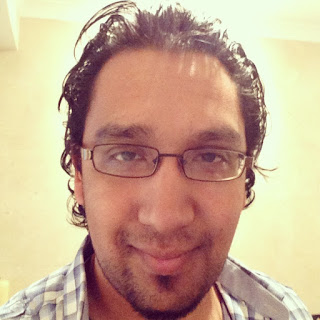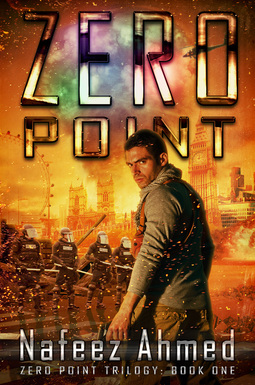
DR NAFEEZ AHMED is a bestselling author, investigative journalist, international security scholar, policy expert, film maker, strategy & communications consultant, and change activist. This year he is also becoming a novelist with his debut science fiction thriller ZERO POINT.
The focus of Nafeez's work is to catalyse social change in the public interest by harnessing radical, systemic approaches to understanding the interconnections between the world's biggest problems, while developing and highlighting holistic strategies for social transformation. Whether it be foreign policy and terrorism, climate change and energy, or food and the economy, Nafeez deploys the techniques of critical, rigorous and interdisciplinary analysis to join the dots and challenge power, with a view to bring forth constructive change.
From April 2013 to July 2014, Nafeez was an environment writer for The Guardian, the world's third most popular newspaper website, where he reported, commented and analysed the geopolitics of interconnected environmental, energy and economic crises at his Guardian hosted blog, Earth Insight. During that period, Nafeez's blog was by far the most popular on the environment site, garnering around 3 million unique views, posting exclusive news reports, and triggering global headlines.
As a journalist, Nafeez has also written features, commentary and analysis for various publications including the Independent on Sunday, The Independent, The Scotsman, Sydney Morning Herald, The Age, Huffington Post, Foreign Policy, Le Monde diplomatique, The New Statesman, Prospect Magazine, the Gulf Times, Daily News Egypt, Daily Star (Beirut), Pakistan Observer, Tehran Times, Bangkok Post, the Georgian Times, the Prague Post, Open Democracy, Raw Story and New Internationalist. His work has also appeared in policy periodicals such as International Affairs (Chatham House), Survival (International Institute of Strategic Studies), Foreign Policy In Focus (Institute for Policy Studies), and Europe's World (Friends of Europe).
Nafeez's journalistic work combines insider information from senior government, intelligence, industry and other sources with interdisciplinary analysis of specialist literature. Over the last decade, he has broken exclusives on FBI whistleblowers and pre-9/11 intelligence warnings; the role of energy in the 2003 Iraq War; pre-7/7 intelligence failures; the 2006 liquid bomb plot; the link between the 'Arab Spring' and ecological, economic and energy crises in the Middle East and North Africa; the depletion of strategic mineral energy resources; cutting-edge climate science; counter-terrorism strategy in the AfPak region; sustainable rural development in Pakistan; the role of energy crisis in the Israel-Palestine conflict; among many others.
Nafeez is co-producer, writer and presenter of the critically-acclaimed documentary feature film, The Crisis of Civilization (2011), adapted by director and producer Dean Puckett from Nafeez's latest book, A User's Guide to the Crisis of Civilization: And How to Save It (Pluto, Macmillan, 2010). The film was endorsed by BAFTA Lifetime award-winning filmmaker Nick Broomfield, and was selected as a Festival Favourite at the Leeds International Film Festival, as well as winning several other film festival awards. It has been broadcast nationally on Link TV in the United States, and in parts of Western and Eastern Europe.
Nafeez's other books include The London Bombings: An Independent Inquiry (Duckworth, 2006); The War on Truth: 9/11, Disinformation and the Anatomy of Terrorism (Interlink, 2005); Behind the War on Terror: Western Secret Strategy and the Struggle for Iraq (New Society, 2003) and The War on Freedom: How & Why America was Attacked, September 11, 2001 (Progressive, 2002). The latter is archived in the '9/11 Commission Materials' Special Collection at theUS National Archives in Washington DC - it was among 99 books made available to each 9/11 Commissioner of the National Commission on Terrorist Attacks Upon the United States to use during their investigations. The book was also a finalist for the 2003 Naples Prize, Italy's most prestigious literary award.
Since 2001, Nafeez is founding Executive Director of the Institute for Policy Research and Development (IPRD), an independent nonprofit digital transmedia think tank for the public interest. Currently, he is also Co-Director of The Concordia Forum, an independent nonprofit think tank and leadership network working to strengthen trans-Atlantic civil society partnerships.
Nafeez's academic work revolves around the historical sociology and political ecology of mass violence in the context of civilizational systems, and focuses on bridging disciplinary divides across the natural and social sciences. He has taught international politics, contemporary history, empire and globalisation at the University of Sussex's School of Global Studies (from where he obtained his PhD in International Relations and MA in Contemporary War & Peace Studies) and Brunel University's Politics & History Unit, where in 2012 he was Visiting Lecturer in Globalisation & Current Affairs. He won the 2010 Routledge-GCP&S Essay Prize for his seminal paper in the journal Global Change, Peace & Security, The International Relations of Crisis and the Crisis of International Relations.
Nafeez's writings have been translated into French, German, Italian, Arabic, Spanish and Chinese. His books have been reviewed positively in the Journal of Peace Research (Sage); Development and Change (Wiley-Blackwell); Middle East Journal (Middle East Institute), Socialism and Democracy (Routledge); Library Journal (Reed Elsevier); among others - and his work is widely cited in high-quality peer-reviewed social science literature. His work has been used by the Coroner's Inquiry into 7/7; the US Army Air University's 'Causes of War' collection (2007); the UK Ministry of Defence's Joint Services Command & Staff College Research Guide on Counter-Terrorism and the GWOT (2008); Chatham House's Middle East Programme; the International Labour Organization's (ILO) 'World Commission on the Social Dimension of Globalization' social science bibliography on impacts of globalization (2003); the Oxford Handbook of Genocide Studies (2010), among others.
Nafeez is a regular media commentator and has appeared on BBC Newsnight, BBC News 24, BBC World Today, BBC World News with George Alagiah, BBC Radio Five Live, BBC Asian Network, Channel 4, Sky News, C-SPAN Book TV, CNN, FOX News with Sean Hannity, Bloomberg, PBS Foreign Exchange with Fareed Zakaria, Al-Jazeera English, Press TV, Islam Channel, US National Public Radio, the US Progressive Radio Network, David Barsamian's Alternative Radio, TUC Radio, and hundreds of other radio and TV shows in the USA, UK, and Europe.
He is also cited and reviewed in the New York Times (Thomas Friedman), Sunday Times (Bryan Appleyard), Times Higher Educational Supplement, The Guardian (Steven Poole), The Independent (Yasmin Alibhai Brown), The Observer (Gore Vidal), Big Issue Magazine, and Vanity Fair (Christopher Hitchens), among other publications.
Nafeez has advised the British Foreign Office, the Royal Military Academy Sandhurst, the UK Defence Academy, the Metropolitan Police Service on delivery of the Home Office's Channel Project, and the UK Parliamentary Inquiry into UK counter-terrorism strategy. He has also consulted for projects funded by the US State Department and the UK Department for Communities and Local Government. In 2005, he testified in US Congress on Western security policy toward al-Qaeda.
About Zero Point - Science Fiction Novel by Nafeez Ahmed
Near future Great Britain is on the brink of collapse. Mass riots. Economic meltdown. Blackouts. And a new oil war in Iraq to keep the world economy afloat.
Iraq War veteran and war crimes whistleblower David Ariel is sick of violence, and trying to make ends meet working for Specialist Protection. But after Prime Minister Carson is brutally assassinated by extremists on Ariel's watch, he is covertly targeted by a compromised police investigation.
When forensics discover that Carson's assassination inexplicably defied the very laws of physics, bodies drop like flies as key witnesses are murdered in impossible circumstances.
Fleeing for his life while London is locked-down under martial law, Ariel gets a phone call from Iraq he will never forget. His estranged girlfriend, journalist Julia Stephenson, warns that the Carson killing is just the beginning of a wider plot to bring the West to its knees. Then she disappears.
Ariel's blood-soaked race against time to track the terror cells behind Carson's death tumbles into the cross-fire of a hidden battle between mysterious rogue intelligence agencies. The goal: to monopolise black budget technologies which could unlock the universe's darkest, arcane secrets.
As the world he thought he knew unravels, Ariel faces off against bent coppers, double-crossing agents, psychic killers and super soldiers to complete a black ops mission like no other: stop Quantum Apocalypse.








